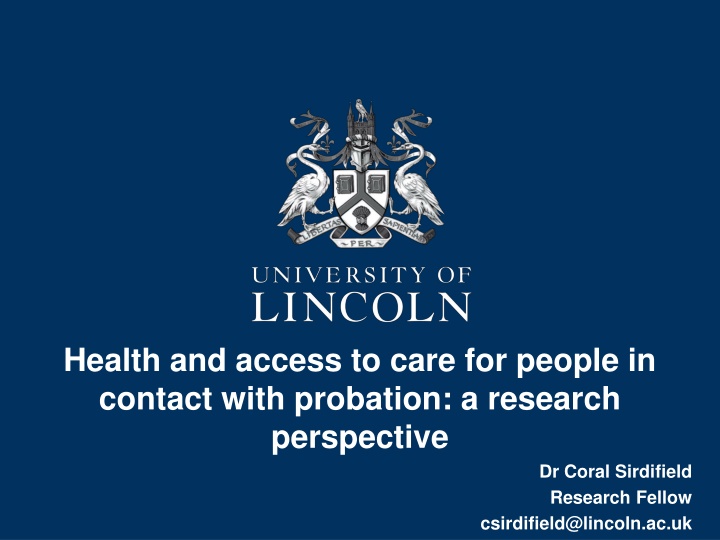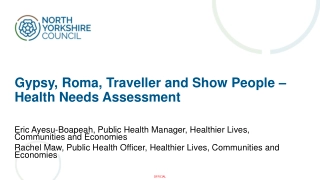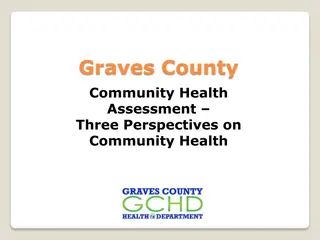Health Needs of People in Contact with Probation: A Research Perspective
Many people in contact with probation face health challenges such as alcohol misuse, drug misuse, mental illness, and self-harm. This research project explores ways to provide effective healthcare for this population to improve health outcomes and reduce re-offending.
Download Presentation

Please find below an Image/Link to download the presentation.
The content on the website is provided AS IS for your information and personal use only. It may not be sold, licensed, or shared on other websites without obtaining consent from the author.If you encounter any issues during the download, it is possible that the publisher has removed the file from their server.
You are allowed to download the files provided on this website for personal or commercial use, subject to the condition that they are used lawfully. All files are the property of their respective owners.
The content on the website is provided AS IS for your information and personal use only. It may not be sold, licensed, or shared on other websites without obtaining consent from the author.
E N D
Presentation Transcript
Health and access to care for people in contact with probation: a research perspective Dr Coral Sirdifield Research Fellow csirdifield@lincoln.ac.uk
The Project We examined: 1. What research tells us about the health of people in contact with probation and the most effective ways of providing healthcare for them to achieve good health outcomes 2. How healthcare is currently provided for people in contact with probation in England 3. What mechanisms can be used to measure and facilitate improvements in the quality of healthcare for this population
Rationale Improving the health of people in contact with probation is important because: Many people in this group are in poor health and subject to negative social determinants of health May lead to wider benefits ( community dividend ) in terms of: Reductions in re-offending Improved health for others Reduced use of crisis care Cost savings for health and justice services
Methods Narrative systematic review of the literature Survey of key stakeholders in England Case studies in six areas of the country
Health Needs Overall we identified a lack of up-to-date research on health needs The research that does exist is highlighted in infographics in our toolkit (probhct.blogs.lincoln.ac.uk) Suggests that people in contact with probation are more likely to experience many health issues than the general population including: Alcohol misuse Drug misuse Mental illness Suicide and self-harm
Providing Effective Healthcare Lack of literature in some areas (e.g. oral health, diet, patient experience/satisfaction) Variety within the literature makes it difficult to recommend any particular model Some promising models such as: Speciality probation caseloads in the USA Specialist APs Psychologically informed and planned environments Also provided examples of potential models of good practice from our case study work in the toolkit, but further research is needed
How Healthcare is Provided Surveys/FOI requests sent to 591 organisations across England: Clinical Commissioning Groups (CCGs) Mental Health Trusts Public Health Departments The National Probation Service (NPS) Community Rehabilitation Companies (CRCs) Probation Approved Premises Overall received responses from 466 organisations (78.8%) but mainly in response to FOI requests
Barriers Findings from surveys, case studies and the literature pointed to barriers to service access: Gaps in provision Lack of clear or clearly understood pathways into services Problems with geographical boundaries and transition points Lack of funding and resources Organisational change Restrictive referral criteria Negative perceptions of people in contact with probation Waiting lists Client motivation/ability to attend Difficulties with GP registration Probation lacks a voice in the commissioning process
Asked: Whether organisations commissioned, provided or received services specifically for probation or with probation-specific elements Whether any work was done to facilitate access to mainstream services for people in contact with probation Also examined JSNAs to see if they considered the health of people in contact with probation
Key Findings (Based on FOI data: 75% of CCGs and 52% of MHTs in England) 12.1% of CCGs commission probation-specific services (4.5%), or services with probation-specific elements (7.6%) 5.7% directly facilitate access to mainstream care for people in contact with probation, and 14% stated that they do so via another organisation that they commission or work with 20% (mistakenly) believe that NHS England are responsible for commissioning healthcare for people in contact with probation 86.2% of MHTs provide probation-specific services (69%), or services with probation-specific elements (17.2%) 75.9% reported facilitating access to mainstream services Very few JSNAs consider the health needs of people in contact with probation gap analysis needed to determine if services meet need
Measuring and Facilitating Improvements in the Quality of Healthcare The case studies and surveys suggested that the following were important: Partnership working needs a centrally driven effort to develop this at all levels (commissioning, training, co-location of staff, shared targets, quality indicators, etc) Clear referral routes for probation Overcoming barriers Improving assessment of health needs We have shared some suggested quality indicators in our toolkit
Summary Importance of improving the health of people on probation Challenges/areas for future research: Health needs Improving data collection and sharing data (key to evidence- based commissioning) Evaluating innovative practice (like the examples in our toolkit) Make sure that CCGs are aware of their responsibilities, and increase the number of JSNAs focusing on people in contact with probation so that we can see if current healthcare provision is meeting need Develop partnership working Further develop quality indicators
This project is funded by the National Institute for Health Research (NIHR) [Research for Patient Benefit programme (Grant Reference Number PB-PG-0815-20012]. The views expressed are those of the author(s) and not necessarily those of the NIHR or the Department of Health and Social Care.























